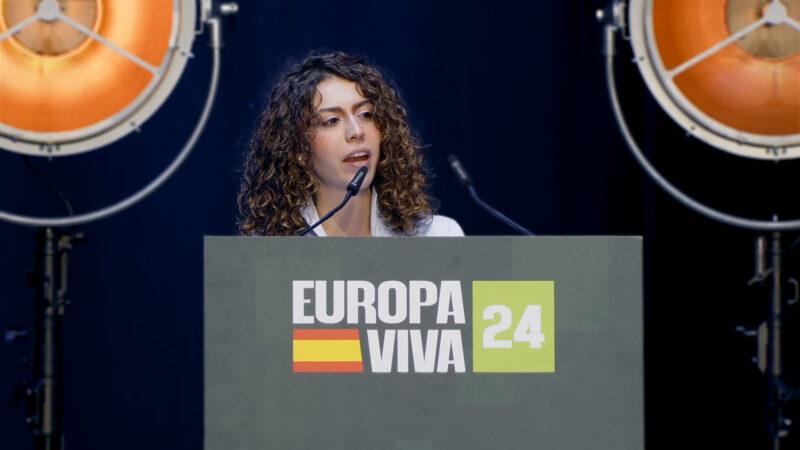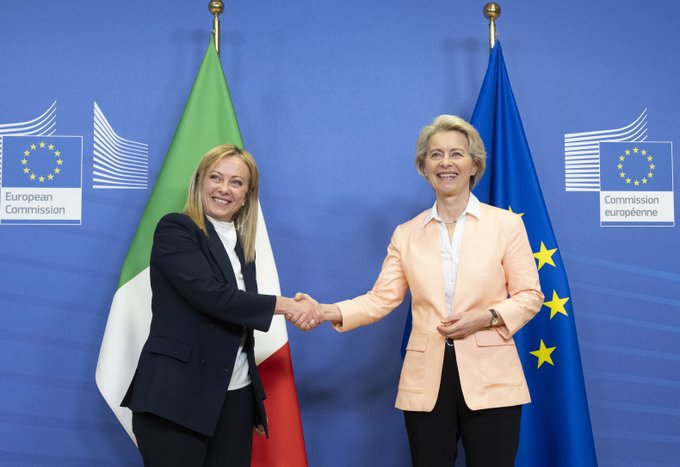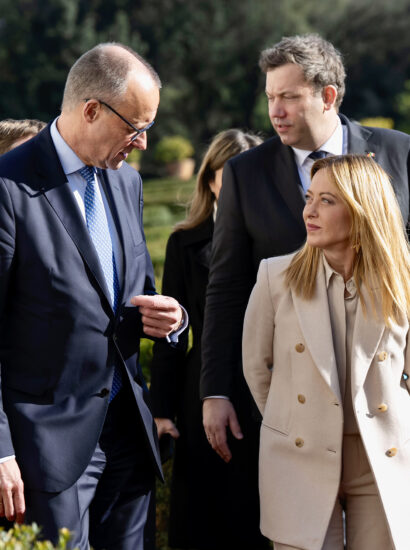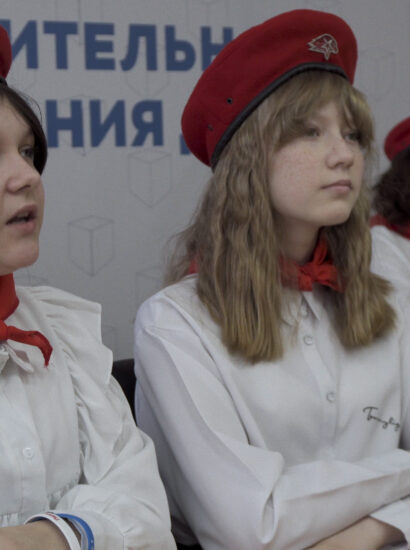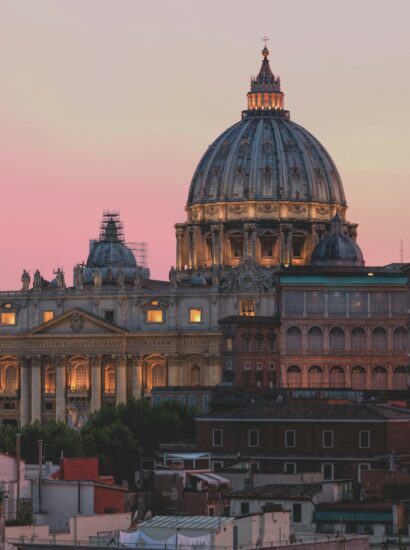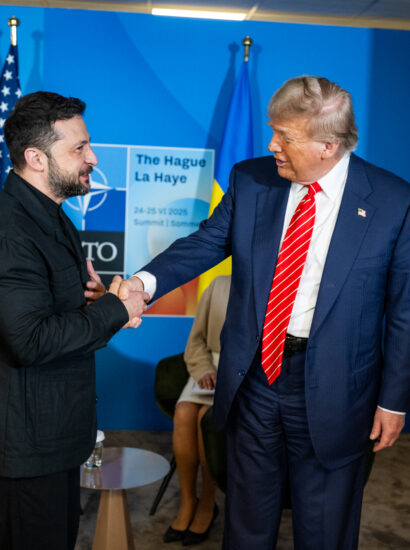The Italian government changed in 2022 when Giorgia Meloni won the elections with more than 25 percent of the vote, making a coalition government with Matteo Salvini and the now deceased Silvio Berlusconi.
From the international press, the leader of Fratelli d’Italia was painted as the new successor of “fascism” or “neo-fascism” in Italy. However, Meloni has been a pragmatic leader and has been able to ally herself with the EPP, Commission President and EPP senior Ursula von der Leyen being one of her great allies; something that seemed practically impossible before the Italian elections. Meloni has also been one of the main defenders of Ukraine in Western Europe, even convincing Viktor Orban, the Hungarian Prime Minister, to accept the latest package of military and financial aid from the European Union to Ukraine.
Apart from her positioning in the international arena, she has advanced in various national policies that have changed Italy, besides being key for the European elections and what may happen concerning the possible entry into the ECR of Fidesz, as already advanced Orbán in his interview in Il Giornale, in addition to the also possible entry of AUR in the ECR. Also, after the exit of AfD from the ID group, there could be a union between the ECR and ID as a single European group.
For all these issues, The Long Brief has decided to interview Alice Carrazza. Carrazza graduated in Political Science of International Relations, specialized in Political Communication. Until recently, she was Head of Communication at the Machiavelli Center for Political and Strategic Studies and Carrazza also managed electoral campaigns at various levels, from local to national. Currently, she is leading Affecting Communication, a company focused on political communication.
Italy has managed to change its course and opt for the “new conservative right.” Why do you think this change has occurred?
Italy’s shift towards the new conservatism of Giorgia Meloni is a phenomenon that fits within a global political context where there is a reconsideration of traditional values and a response to economic and social crises. Recent polling data ahead of the vote shows Fratelli d’Italia leading with 27.2 per cent, followed by PD and M5S. This clearly confirms the Italian public’s support for the Meloni government. This is not at all a given in an era where the electorate is primarily defined as mobile, due to its constant fluctuations among various political alternatives.
Fratelli d’Italia emerged in the 2022 national elections, proposing and embodying an alternative to the existing political system, offering new hope to Italians who, after the global economic crisis and the pandemic, were in need of change and consistency.
Meloni has repeatedly demonstrated remarkable resilience and adaptability.
Additionally, the ability to address the electorate’s concerns and tailor their political message suggests that they could remain a significant presence in the Italian political landscape for years to come. It can be said that the success of the “new conservative right” in Italy reflects a combination of internal and global factors, and the outcome of these European elections will further confirm this change in direction.
On a national matter, Italy closed 2023 with an unemployment rate of 7.2 per cent, the lowest since 2008. What have been the main measures to end this?
This achievement was made possible through various policies and targeted interventions. The government introduced hiring incentives, such as tax reductions and contribution exemptions for companies that hire, with particular attention to young people and women, categories often more affected by unemployment.
Additionally, professional training and retraining programs were implemented, allowing workers to acquire new skills demanded by the labor market, thereby increasing their employability. Law No. 85 of July 3, 2023, also simplified access to the labor market through a series of urgent measures for social inclusion.
Support for small and medium-sized enterprises, which represent a crucial part of the Italian economic fabric, has also stimulated the creation of new jobs.
Public and private investments in labor-intensive sectors, such as infrastructure and technology, have generated further job opportunities. These measures, along with the political commitment to restore Italy’s prominent role on the international stage, have significantly contributed to expanding opportunities and reducing the unemployment rate.
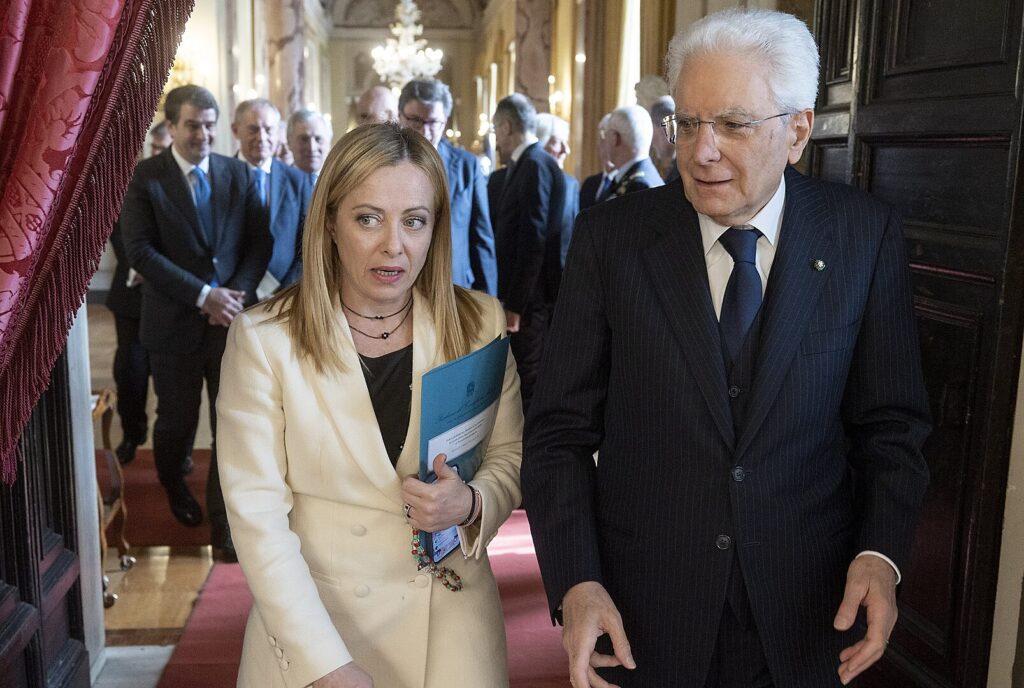
Giorgia Meloni with Italian President Sergio Mattarella in March 2023 (Photo: Quirinale.it / Wikimedia Commons)
There are some conservatives a bit disappointed with the management on immigration in Italy, in fact, Meloni herself acknowledged in January 2024 that she was not satisfied. Has she really changed the situation regarding illegal immigration or in the future can she do it more strongly?
The issue of immigration is undoubtedly complex and multifaceted. Under the leadership of Giorgia Meloni, the Italian government has undertaken a series of reforms and initiatives to address illegal immigration, including international agreements and the introduction of new laws. These measures reflect a commitment to a long-term vision for immigration management.
Significant changes do not happen overnight. Recently introduced policies, such as the Mattei Plan, aim to encourage investments in African countries to reduce migration to Italy. This approach seeks not only to address the root causes of migration but also to promote economic development.
However, immigration is not solely an issue for Italy but for all of Europe. This is evidenced by the fact that this topic is central to all European party campaigns.
Citizens are now aware of the problem and perceive it in their daily lives, questioning not only its impact on national security but also its impact on European identity.
Therefore, a joint vision is necessary, focusing both on defending national borders and preserving our European identity. With strong conservative leadership at the helm of Europe, Giorgia Meloni will no longer face this challenge alone but will be able to address it more decisively with the support of allies.
Internationally, Meloni’s government has been supportive of Ukraine, but seems to have distanced itself a bit from Israeli Prime Minister Benjamin Netanyahu, why has this happened?
The Meloni government has not distanced itself but rather taken a balanced position. This does not necessarily mean a withdrawal but rather considering both national interests and humanitarian principles. It is important to remember that the Italian Constitution enshrines the repudiation of war as an instrument of offense against the freedom of other peoples and as a means of resolving international disputes. Therefore, while the Meloni government firmly supports Ukraine, it seeks not to distance itself from Israel but to adopt a stance consistent with the Italian constitutional principles of rejecting war and promoting peace, also considering the humanitarian implications of political actions.
Thus, by recognizing Italy’s role as a mediator and peacebuilder, its foreign policy positions can be better understood.
By respecting the Constitution, the government has the task of maintaining a balance between defending democratic values and the necessity of protecting human rights
Also, in the international scene, Meloni has been one of the people who has most criticized the “neocolonialism” exercised by France with Africa, and recently, Meloni has developed the “Mattei Plan”, what does this plan consist of and how do you think it can be developed in the long term with African countries?
The Mattei Plan focuses on five major intervention priorities: education and training, health, agriculture, water, and energy. This multidimensional approach is designed to address the fundamental needs of African countries and promote stability and security. Additionally, the plan envisions significant investment, aiming to mobilize at least 5,5 billion euros over the next five to seven years.
Far from a colonizing vision, the Mattei Plan aims to restore Italy to a central political and strategic position in the Mediterranean.
Moreover, this plan becomes an opportunity, not only for Italy, but for Europe as a whole, as it aims to address the migration issue while also opening a door for dialogue with the African continent.
In the long term, the Mattei Plan could develop a more equitable and mutually beneficial relationship between Italy and African countries. Through targeted investments and a commitment to sustainable development, the plan could help reduce dependence on external aid and create local economic opportunities. Furthermore, it could serve as a model for other European countries on how to interact with Africa in a more equitable and less neocolonial manner.
The success of the Mattei Plan will depend on its ability to adapt to the specific needs of African countries, promote transparency, and ensure that the benefits of development are shared equitably.
If managed correctly, the Mattei Plan could represent a significant step toward a new era of cooperation between Italy and Africa.
Ursula von der Leyen, President of the European Commission, said that the cooperation of the EPP with the ECR because of people like Meloni could be opened. What is the possibility of a real cooperation between the EPP with the ECR?
Her openness towards the ECR, particularly for figures like Giorgia Meloni, could be interpreted more as a personal strategic move than an indication of imminent changes in European political alliances. This statement came from Ursula von der Leyen, not a member of the ECR group.
The current situation shows von der Leyen under pressure, with increasing criticism from EU member states over her handling of key issues. These tensions have been further exacerbated by the recent attack from Charles Michel, who urged the depoliticization of the role of President of the European Commission, a veiled attack on von der Leyen. We are witnessing a power struggle among those who have held power for too long, and von der Leyen could be seen as the “designated culprit,” pushing her to seek new allies. However, the real possibility of cooperation between the EPP and ECR will be determined by the election results, as it will be the European citizens who decide who they want to lead Europe. Politicians, in turn, will have to choose the option that best represents the popular will and the long-term interests of the European Union.
If the possibility of cooperation between the two groups (ECR and EPP) finally opens up, could the ECR revalidate von der Leyen for the position of President of the European Commission?
The possibility of cooperation between the ECR (European Conservatives and Reformists) and the EPP (European People’s Party) could open new dynamics within the European Parliament.
However, the endorsement of Ursula von der Leyen for the position of President of the European Commission by the ECR might not be as straightforward.
The electoral campaigns of ECR members have often portrayed Von der Leyen as an adversary, emphasizing divergences on key issues such as national sovereignty and EU centralization. Consistency with these messages is crucial to maintain the trust of their voters. Additionally, the ECR could leverage the growing media and political attention to negotiate from a position of strength, seeking significant concessions in exchange for their support.
The current political reality suggests that the ECR may pursue a more independent strategy coherent with their core principles, rather than automatically endorsing the current leadership of the European Commission.
Politico published a few days ago the possibility of a grand coalition between Le Pen and Meloni in Europe, do you think that with the expulsion of AfD, the ECR and ID could form a single group?
A grand coalition between Le Pen and Meloni in Europe is a complex and multifaceted issue. Such a move could be seen as an attempt to consolidate and unite right-wing forces, modeled after the Italian government.
However, the situation is dynamic, and the expulsion of the AfD from the ID group could significantly impact the configuration of political groups in the European Parliament.
The ECR might seek to position itself as a negotiating partner, but this remains to be seen. While the idea of a single group combining ECR and ID is appealing to many conservatives, political realities and internal group dynamics could make this prospect more complicated than it appears.
The outcome of the elections will shape the future political landscape of Europe and determine whether such a coalition is feasible.

